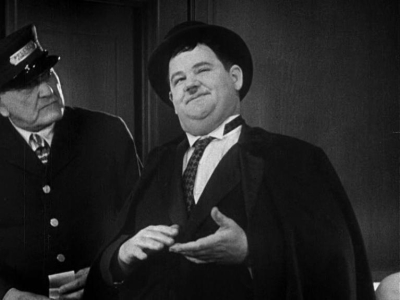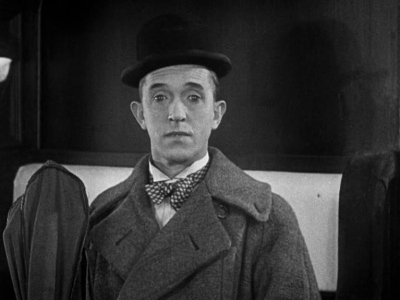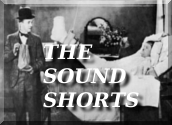BERTH MARKS
Written and filmed April, 1929. Released by MGM, June, 1929. Produced by Hal Roach. Directed by Lewis Foster. Two reels.Cast: Stan Laurel, Oliver Hardy, Harry Bernard, Charlie Hall, Baldwin Cooke.
STORY: Stan and Ollie are musicians, travelling by train to their next gig in Pottsville. They spend most of the trip trying to change into pajamas and get comfortable in a cramped upper berth.

 JB:
The first few minutes in the train station has some fun business with
Stan and Ollie missing each other, dropping all their sheet music,
people tripping over Stan's bass fiddle and other simple stuff.
There is also a sound for sound sake's gag as the conductor calls
out the train's various destinations in an unintelligible mumble.
JB:
The first few minutes in the train station has some fun business with
Stan and Ollie missing each other, dropping all their sheet music,
people tripping over Stan's bass fiddle and other simple stuff.
There is also a sound for sound sake's gag as the conductor calls
out the train's various destinations in an unintelligible mumble.
But Berth Marks goes
awry during the upperberth sequence. The situation is ripe with
possibility - Stan and Ollie confined in a tiny space, trying to get
undressed and to sleep. But the scene emphasizes all the wrong
things. Ollie's frequent kicking and slapping of Stan comes off
as unwarranted abuse (Stan really can't help getting in Ollie's way
this time), and Stan's cry, quickly becoming a patented trademark, is
like more like the wimper of a sad little boy being punished for
something he didn't do than the inane high-pitched screech we will come
to know and love. It is one of the only times Stan's crying
generates sympathy instead of laughter. Oliver Hardy's attempt at
ad-libbing dialogue begins and ends with the phrase "Will you please
stop crowding me?", which he repeats, with variations, endlessly.
There is no rhythm to the sequence, and little punctuation.
It is just five minutes of Stan and Ollie being very
uncomfortable. There are one or two laughs in the sequence, but since
this is film's main setpiece, one or two laughs is simply not good
enough.
Berth Marks probably
receives more criticism than is warranted. It is below-average,
but considering the problems faced by the filmmakers at the time, this
is not unexpected. Roach was releasing silent versions of his new
talking films, for theaters that were not yet hooked up for sound.
Editing these things for both markets must have been a nightmare.
Like the second Our Gang talkie, Railroadin', Berth Marks is a big step above the previous short technologically. The next film, Men o' War will be an all-around improvement, and Perfect Day will show how quickly Laurel and Hardy and their crew quickly found their way in the new world of talking films.
 JL: Berth Marks
suffers from being a product of the transitional period between silents
and talkies, although most of the film is technically adroit in terms
of setups and composition. Except for the upper-berth sequence,
there are no long stretches of static camera work (in the manner of Unaccustomed as We Are),
nor are actors grouped uncomfortably in a stagy, non-cinematic
way. Ironic, therefore, that most of the film's problems occur in
what should have been the simplest scene to stage and shoot. The
sleeping-berth routine might have been improved with at least two
camera setups, thereby allowing for some much-needed editing. But
the film was made during the brief period when editing and synching
sound and picture was a daunting task.
JL: Berth Marks
suffers from being a product of the transitional period between silents
and talkies, although most of the film is technically adroit in terms
of setups and composition. Except for the upper-berth sequence,
there are no long stretches of static camera work (in the manner of Unaccustomed as We Are),
nor are actors grouped uncomfortably in a stagy, non-cinematic
way. Ironic, therefore, that most of the film's problems occur in
what should have been the simplest scene to stage and shoot. The
sleeping-berth routine might have been improved with at least two
camera setups, thereby allowing for some much-needed editing. But
the film was made during the brief period when editing and synching
sound and picture was a daunting task.
John B.'s comments made me wonder if the
sequence might play better without sound. Unfortunately,
no. It's uncomfortable and monotonous either way. I would
imagine that the silent version of the film (which I've never seen) has
no significant differences, since there's no way to seamlessly edit the
scene to make the desired improvements.
Berth Marks is a yawner, but it's not an endurance test in the manner of The Laurel-Hardy Murder Case, Twice Two, or Oliver the Eighth. It seems a casual, tossed-off entry, and it's no better or worse than can be expected for such a film.
Copyright © 2012 John Larrabee, John V. Brennan





